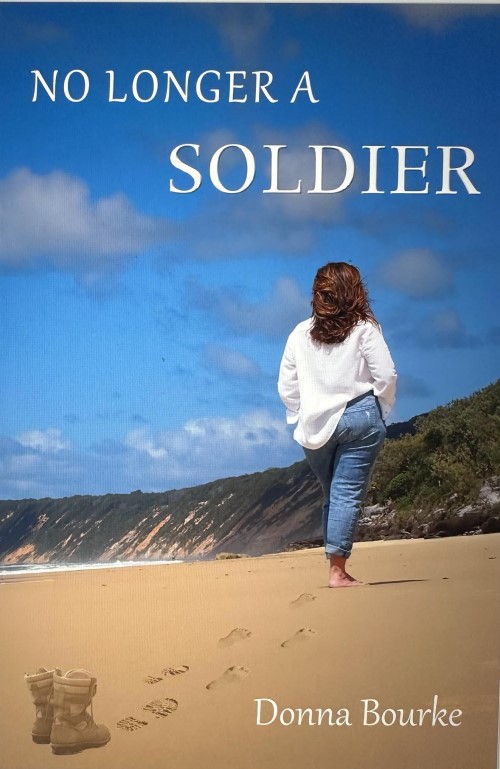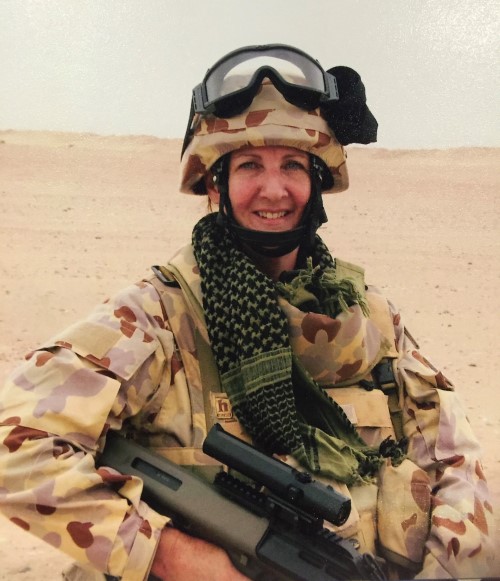Identity crisis of a female warrior

Reviewed by Dr Patrick Mullins
Donna Bourke’s first volume of memoirs, Hidden Courage, focused on her lengthy Army career and ended with her 2016 medical discharge. Having joined the military in 1979 and serving in a variety of roles, including deployments to Timor-Leste and Afghanistan, Bourke wrote with enthusiasm about the highs of army life: the camaraderie, the purpose, the delight in learning, and the places she went.
Running throughout, however, was a more sober re-evaluation of the requirements of that career. Most prominent was the considerable systematic and individual sexism that she navigated and contended with. But following close behind was the institutional obligation that Bourke and her peers compartmentalise any aspect of their life that could affect their work as soldiers – mental health issues most of all.
The first half of this sequel memoir, No longer a soldier, traces the effects of that compartmentalising after Bourke’s discharge. The mental and physical health problems she had upon her departure are exacerbated by the bitter circumstances of her discharge and the difficulty of adjusting to life outside the institution to which Bourke had given her working years.
Who am I, she asks, if not a soldier? Without the pass-fail standard of military life, without the clear paths and hierarchies, without the urgency of orders and all-encompassing missions, Bourke grapples for some purchase.
Her memoir offers an account of the dead ends, repetitive fields, and rocky stretches that she treads through while trying to blaze her own path. There are yoga sessions that do nothing to give her peace of mind, doctors who are well meaning but ineffective, moments of respite that are too momentary.
There are comic moments: availing herself of San Francisco’s liberal cannabis laws, Bourke hallucinates that she and her husband are marionettes who have lost their strings.
Other moments are darker but betray a wry self-awareness: back home, Bourke pursues a would-be thief across a paddock as though she is still in Afghanistan, ‘facing the Taliban’. Then there are the moments that are inadvertent and passing but prove more important: while moving house, Bourke packs the mementoes of her career into a box that she leaves, in the new house, unpacked. ‘Out of sight, out of mind,’ she writes.
No longer a soldier is not always a fluent read, and some diversions are unnecessary padding. But, in its messy trajectory, Bourke’s memoir dramatises the search for an answer to who and what she is, now, outside of the military.

That she has repeated the problem of compartmentalising comes to Bourke only at the end, when she unpacks that box of mementoes – awards, photos, reports – and realises that the conclusion of her Army career does not define the whole of that career, nor define her now. ‘My career wasn’t insignificant just because I had been medically discharged,’ she writes. ‘…I may no longer be a soldier, but I am unapologetically, proudly, and imperfectly me.’
The second half of No longer a soldier consists of accounts by 5 other soldiers of their transition from military to civilian life. While preserving an individual and subjective character, the striking similarities of these 5 accounts lend Bourke’s final realisation about herself a retrospective, greater weight.
The journeys of Bourke and her 5 fellow veterans are not over, but in their clear-eyed apprehension of who they are now, in the military and outside of it, there is something important: a sense that their futures are theirs to make.
Dr Patrick Mullins is a writer and historian with DVA and a Visiting Fellow at the National Centre of Biography, ANU. He is the author of 6 books, including Tiberius with a Telephone (2018), which won the 2020 National Biography Award and the NSW Premiers’ Literary Award for Non-Fiction.
Images:
No longer a soldier, by Donna Bourke, InHouse Publishing; 297 pages; $30.
Donna Bourke in Afghanistan
